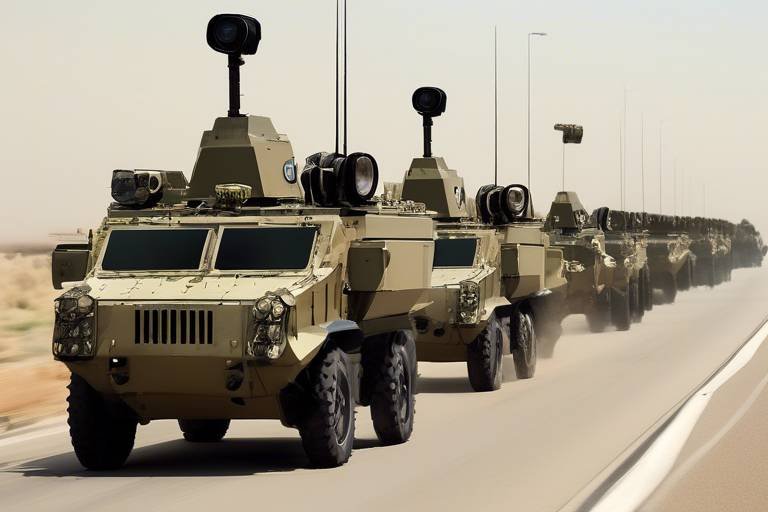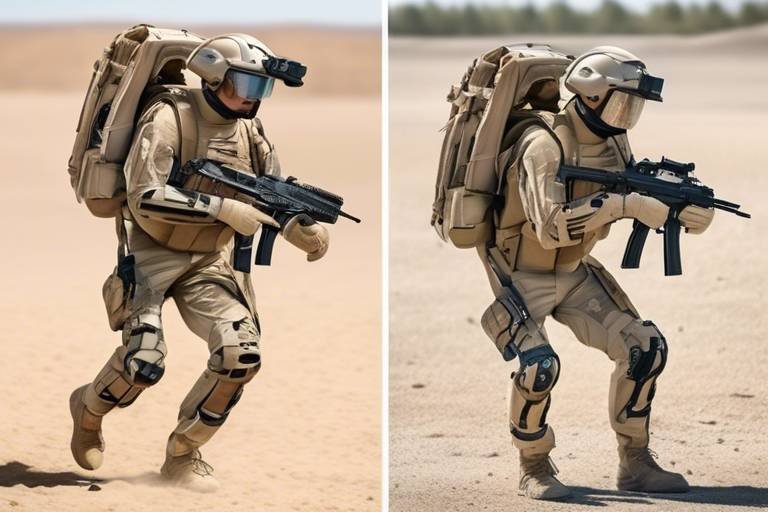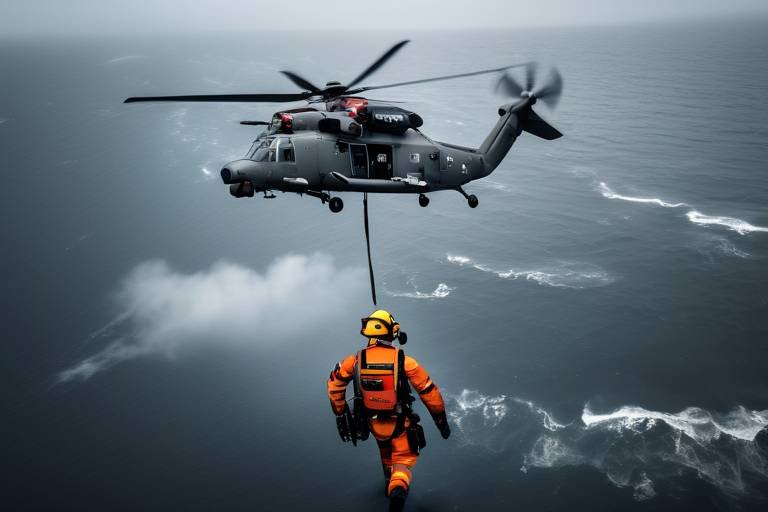Exploring the Role of Quantum Sensors in Battlefield Intelligence
The battlefield has always been a place of chaos and uncertainty, where the fog of war can obscure even the best-laid plans. However, with the advent of quantum sensors, military operations are undergoing a transformative shift. These cutting-edge devices are not just enhancing the way we gather data; they're revolutionizing the entire landscape of battlefield intelligence. Imagine having the power to detect movements, assess situations, and make informed decisions in real-time, all thanks to the principles of quantum mechanics. This article delves into how quantum sensors are reshaping military strategies and improving operational effectiveness.
At their core, quantum sensors leverage the strange and fascinating principles of quantum mechanics to measure physical quantities with an accuracy that was previously unimaginable. Unlike classical sensors, which rely on traditional physical laws, quantum sensors exploit phenomena such as superposition and entanglement. This allows them to achieve a level of precision that can be a game-changer in military applications. For instance, while a classical sensor might struggle to detect a subtle change in gravitational pull, a quantum sensor can pick up such minute variations, opening up new avenues for intelligence gathering and operational planning.
Quantum sensors have a wide array of applications in military operations, acting as a force multiplier in various domains. From navigation and communication to detection and surveillance, these sensors enhance situational awareness and operational effectiveness on the battlefield. Their ability to provide real-time insights means that military leaders can make timely decisions based on accurate data, rather than relying on outdated or incomplete information. Let's explore some specific use cases where quantum sensors are making a significant impact.
One of the most critical aspects of military operations is navigation, and quantum sensors are taking this to the next level. In environments where GPS signals are unreliable or nonexistent, such as dense urban areas or remote terrains, quantum sensors provide accurate positioning data. This capability is crucial for maneuvering troops and equipment effectively. Imagine a scenario where a battalion needs to traverse a mountainous region without GPS; quantum technology can enable precise location tracking, ensuring that every step taken is calculated and strategic.
Among the various types of quantum sensors, quantum accelerometers stand out for their ability to measure acceleration with exceptional sensitivity. These devices play a vital role in improving inertial navigation systems, which are essential for tracking the movement of military assets. In challenging conditions where traditional navigation methods falter, quantum accelerometers ensure that forces remain on course, enhancing overall mission success.
Another fascinating application of quantum sensors is in the realm of quantum gravimetry. These advanced devices measure gravitational fields with remarkable accuracy, allowing military forces to detect underground structures or movements. This capability is invaluable for identifying enemy positions or hidden installations, providing a strategic advantage in battlefield intelligence. By harnessing the power of quantum gravimeters, military planners can gain insights that were once thought to be beyond reach.
In the realm of surveillance, quantum sensors are proving to be indispensable. Their ability to identify subtle changes in the environment enhances the military's capacity to monitor enemy activities and secure sensitive areas. For instance, a quantum sensor can detect minute shifts in temperature or electromagnetic fields, indicating the presence of concealed threats. This level of vigilance is crucial for maintaining operational security and ensuring that military personnel are always one step ahead of potential adversaries.
Despite their immense potential, quantum sensors are not without challenges. Issues such as environmental sensitivity and technological complexity pose significant hurdles to their widespread adoption in military contexts. Understanding these limitations is crucial for developing effective strategies to integrate quantum sensors into existing military frameworks.
Quantum sensors can be highly sensitive to environmental factors, including temperature fluctuations and electromagnetic interference. These sensitivities can compromise the accuracy of measurements, leading to potential failures in critical situations. Ongoing research is focused on developing solutions to mitigate these impacts, ensuring that quantum sensors can perform reliably in diverse conditions.
The intricate technology behind quantum sensors can complicate their deployment and maintenance. Specialized training is often required to effectively integrate these sensors into military operations. As the technology continues to evolve, addressing these technical barriers will be essential for maximizing the benefits of quantum sensors in the field.
The future of quantum sensors in warfare looks incredibly promising. With continuous advancements in quantum technology, we can expect to see innovative applications that further enhance battlefield intelligence and military strategy. As these sensors become more refined and widely adopted, they will undoubtedly change the way military operations are conducted, making them more efficient and effective than ever before.
- What are quantum sensors? Quantum sensors are devices that utilize principles of quantum mechanics to measure physical quantities with high precision.
- How do quantum sensors differ from classical sensors? Unlike classical sensors, quantum sensors exploit phenomena such as superposition and entanglement, allowing them to achieve greater accuracy.
- What are some military applications of quantum sensors? Quantum sensors are used in navigation, communication, detection, and surveillance to enhance situational awareness and operational effectiveness.
- What challenges do quantum sensors face? Quantum sensors face challenges such as environmental sensitivity and technological complexity, which can hinder their deployment and effectiveness.
- What does the future hold for quantum sensors in warfare? The future looks promising, with ongoing advancements expected to further enhance their applications in military operations.

Introduction to Quantum Sensors
Quantum sensors are at the forefront of technological innovation, harnessing the bizarre principles of quantum mechanics to achieve measurement capabilities that were once thought to be the stuff of science fiction. Unlike traditional sensors that rely on classical physics, quantum sensors exploit the unique behaviors of particles at the quantum level, such as superposition and entanglement. This allows them to measure physical quantities with an accuracy that surpasses conventional methods by orders of magnitude. Imagine trying to find a needle in a haystack; now, picture having a super-powered magnet that not only points to the needle but can also detect its exact location amidst all the hay. That’s the kind of precision we’re talking about!
To put it simply, while classical sensors might struggle to give you a clear picture of your surroundings in complex environments, quantum sensors can cut through the noise. This distinction is crucial, especially in military contexts where every second counts and the difference between success and failure can hinge on accurate data. For instance, a classical sensor might provide a rough estimate of troop movements, but a quantum sensor could pinpoint exact locations and movements, providing a strategic advantage.
As we dive deeper into the world of quantum sensors, it’s essential to understand some of their key characteristics that set them apart:
- High Sensitivity: Quantum sensors can detect minute changes in physical quantities, making them invaluable in situations where precision is paramount.
- Real-Time Data: These sensors offer real-time insights, allowing military operations to adapt rapidly to changing conditions on the battlefield.
- Robustness Against Interference: Quantum sensors are designed to function effectively even in environments filled with electromagnetic interference, a common challenge for traditional sensors.
The applications of quantum sensors in military operations are vast and varied. They can enhance everything from navigation systems to surveillance capabilities, fundamentally transforming how military forces gather and interpret data. As we explore these applications in the subsequent sections, it becomes clear that the integration of quantum technology into military operations is not just a trend; it’s a revolutionary shift that promises to redefine the landscape of modern warfare.

Applications in Military Operations
Quantum sensors are not just a futuristic idea; they are actively reshaping the landscape of military operations today. Imagine a world where soldiers can navigate through dense forests or urban environments without relying solely on GPS. This is where quantum sensors come into play, providing unparalleled accuracy and reliability. Their applications are diverse, spanning various critical areas such as navigation, communication, detection, and surveillance. Each application enhances situational awareness and operational effectiveness, making them indispensable tools in modern warfare.
One of the most significant advantages of quantum sensors is their ability to operate in environments where traditional technologies falter. For instance, in battle scenarios where GPS signals are jammed or unavailable, quantum sensors can ensure that troops maintain accurate positioning. This capability is crucial for maneuvering forces effectively and avoiding friendly fire, which can be catastrophic in high-pressure situations.
Let’s dive deeper into some specific use cases:
- Navigation: Quantum sensors, particularly quantum accelerometers and gravimeters, are revolutionizing navigation systems. They provide precise data that allows military units to move confidently through challenging terrains, ensuring they can reach their objectives without getting lost.
- Communication: These sensors can also enhance communication systems by providing secure channels that are less susceptible to interception. This is vital in maintaining operational secrecy and ensuring that sensitive information is shared only among authorized personnel.
- Detection: Quantum sensors excel at detecting subtle changes in the environment, making them invaluable for monitoring enemy movements and securing sensitive areas. They can identify vibrations or disturbances caused by troop movements, giving military strategists a critical advantage.
Moreover, the integration of quantum sensors into existing military systems is not just about replacing old technology; it’s about enhancing the capabilities of current systems. For example, when combined with artificial intelligence, quantum sensors can analyze vast amounts of data in real-time, providing commanders with actionable insights faster than ever before. This synergy between quantum technology and AI can lead to more informed decision-making on the battlefield, ultimately saving lives and resources.
In essence, the applications of quantum sensors in military operations are vast and varied. They are not merely a technological upgrade; they represent a fundamental shift in how military forces can operate. As we continue to explore and develop these technologies, the potential for improved efficiency and effectiveness in military operations is boundless.
- What are quantum sensors?
Quantum sensors are devices that utilize the principles of quantum mechanics to measure physical quantities with exceptional precision, significantly outperforming classical sensors. - How do quantum sensors improve military operations?
They enhance navigation, communication, detection, and surveillance capabilities, providing real-time insights and allowing for more effective decision-making on the battlefield. - Are quantum sensors affected by environmental factors?
Yes, quantum sensors can be sensitive to environmental changes such as temperature and electromagnetic interference, which poses challenges for their deployment. - What is the future of quantum sensors in warfare?
The future looks promising, with ongoing research and technological advancements expected to expand their capabilities and applications in military contexts.

Enhanced Navigation Systems
In the realm of modern warfare, navigation is not just a matter of getting from point A to point B; it’s about doing so with pinpoint accuracy, especially in environments where traditional systems may falter. Enter quantum sensors, which are revolutionizing the way military forces navigate through challenging terrains. Unlike conventional GPS systems that can be rendered useless in dense urban areas or under heavy foliage, quantum sensors provide a robust solution, ensuring that troops can maintain their bearings even in the most chaotic of situations.
Imagine being in a dense forest, surrounded by towering trees and the sounds of distant enemy movements. In such a scenario, relying solely on GPS could lead to disastrous consequences. Quantum sensors, however, utilize the principles of quantum mechanics to deliver highly precise positioning data. This technology is particularly beneficial in GPS-denied environments, where traditional signals are weak or non-existent. By measuring changes in acceleration and gravitational fields, these sensors create a detailed picture of the surroundings, allowing military units to navigate safely and efficiently.
One of the standout technologies in this domain is the quantum accelerometer. These devices measure acceleration with an unparalleled level of sensitivity. They play a crucial role in enhancing inertial navigation systems, which are essential for tracking the movement of military assets. When troops are on the move, whether on foot or in vehicles, maintaining accurate speed and direction is vital. Quantum accelerometers ensure that every movement is tracked with precision, allowing commanders to make informed decisions in real-time.
Additionally, quantum gravimetry emerges as another powerful tool in the navigation arsenal. By measuring gravitational fields with exceptional accuracy, quantum gravimeters can detect underground structures or shifts in terrain that may indicate enemy movements. This ability to "see" beneath the surface provides a strategic advantage, enabling military planners to anticipate potential threats and position their forces accordingly. The integration of these technologies can significantly enhance situational awareness and operational effectiveness on the battlefield.
To summarize, the advancements in quantum navigation systems are not just theoretical; they are transforming how military operations are conducted. With the ability to function in environments where traditional systems fail, quantum sensors are paving the way for a new era of battlefield intelligence. As military forces continue to adapt to the complexities of modern warfare, the role of these sensors will only grow, ensuring that troops can navigate with confidence, even in the most challenging conditions.
- What are quantum sensors? Quantum sensors use the principles of quantum mechanics to measure physical quantities with high precision, offering advantages over classical sensors.
- How do quantum sensors improve navigation? They provide accurate positioning data in GPS-denied environments, allowing for reliable tracking of military assets.
- What is a quantum accelerometer? A quantum accelerometer is a device that measures acceleration with high sensitivity, enhancing inertial navigation systems.
- Can quantum sensors detect underground structures? Yes, quantum gravimeters can measure gravitational fields accurately, helping to identify underground structures or enemy movements.

Quantum Accelerometers
Quantum accelerometers are a groundbreaking innovation in the realm of navigation technology, particularly for military applications. Unlike traditional accelerometers that rely on mechanical components, quantum accelerometers utilize the principles of quantum mechanics to measure acceleration with unparalleled sensitivity. This incredible precision is crucial for military operations, especially in environments where GPS signals may be unreliable or entirely absent, such as urban canyons or dense forests.
Imagine trying to navigate through a thick fog without any landmarks; that's what military personnel face when they lose GPS signals. In these situations, quantum accelerometers serve as a reliable guide, providing accurate positioning data that allows troops to maneuver effectively. By measuring changes in velocity and orientation, these advanced sensors can track the movement of military assets with remarkable accuracy, ensuring that operations remain seamless even in the most challenging conditions.
One of the standout features of quantum accelerometers is their ability to detect minuscule changes in acceleration. This capability is vital for applications such as:
- Inertial Navigation Systems: Quantum accelerometers enhance inertial navigation systems, making them more reliable and efficient. By continuously monitoring changes in motion, they can provide real-time updates on the position of vehicles and personnel.
- Flight Navigation: In aviation, these sensors are instrumental in ensuring that aircraft maintain their intended flight paths, particularly during critical phases of flight like takeoff and landing.
- Submarine Navigation: For submarines operating underwater, where GPS signals are non-existent, quantum accelerometers are essential for maintaining accurate navigation.
Moreover, the compact size and lightweight nature of quantum accelerometers make them ideal for integration into various military platforms, from drones to ground vehicles. Their ability to function accurately in extreme conditions—be it high altitudes or deep underwater—further enhances their appeal for military applications.
As technology continues to evolve, the potential for quantum accelerometers to revolutionize battlefield navigation is immense. Ongoing research aims to refine these sensors, making them even more robust and easier to deploy. The military's investment in quantum technology reflects a broader trend toward embracing cutting-edge innovations that promise to enhance operational effectiveness and situational awareness on the battlefield.
- What are quantum accelerometers? Quantum accelerometers are advanced sensors that use quantum mechanics to measure acceleration with high precision, making them ideal for navigation in GPS-denied environments.
- How do quantum accelerometers differ from traditional accelerometers? Unlike traditional accelerometers that rely on mechanical components, quantum accelerometers utilize quantum phenomena, allowing for greater sensitivity and accuracy in measurement.
- What military applications benefit from quantum accelerometers? Military applications include inertial navigation systems for vehicles, aircraft navigation, and underwater navigation for submarines.
- Are quantum accelerometers affected by environmental conditions? While they are highly sensitive, ongoing research aims to mitigate the effects of environmental factors such as temperature and electromagnetic interference.

Quantum Gravimetry
Quantum gravimetry is a groundbreaking technology that harnesses the principles of quantum mechanics to measure gravitational fields with exceptional precision. Unlike classical gravimeters, which can only provide a rough estimate of gravitational variations, quantum gravimeters can detect minute changes in gravity, making them invaluable tools in military applications. Imagine being able to pinpoint the exact location of underground bunkers or hidden enemy movements just by measuring the gravitational pull of the Earth in that area. This capability can provide a significant strategic advantage on the battlefield.
At the core of quantum gravimetry is the use of interferometry, a technique that exploits the wave-like properties of particles. By bouncing atoms—often rubidium or cesium—against each other and measuring the interference patterns that emerge, quantum gravimeters can achieve levels of sensitivity that are orders of magnitude greater than traditional methods. This advanced technology allows military forces to gather critical intelligence that was previously unattainable, giving them a clearer picture of the operational landscape.
One of the most fascinating aspects of quantum gravimetry is its ability to detect changes in gravitational fields caused by various factors, including:
- Underground structures such as tunnels or bunkers.
- Movements of troops or vehicles.
- Natural geological changes that may impact military operations.
For example, in a conflict zone, a quantum gravimeter could be deployed to monitor an area for any unusual gravitational anomalies that might indicate the presence of hidden enemy assets. This real-time data can be crucial for planning maneuvers and ensuring the safety of troops on the ground. Moreover, the ability to operate in various environments, including urban settings where GPS signals may be obstructed, further enhances the utility of quantum gravimeters.
In terms of deployment, quantum gravimeters can be integrated into various platforms, including drones and ground vehicles, allowing for flexible and mobile reconnaissance missions. Imagine a drone equipped with a quantum gravimeter flying over a suspected enemy territory, sending back detailed information about gravitational anomalies that could indicate hidden threats. This capability not only enhances situational awareness but also contributes to a more informed decision-making process in military operations.
However, despite their immense potential, the adoption of quantum gravimetry in military contexts is not without challenges. The technology is still relatively new, and there are significant hurdles to overcome, including the need for specialized training for operators and the integration of these systems into existing military frameworks. As research and development continue, we can expect to see improvements in the robustness and accessibility of quantum gravimeters, paving the way for their broader use in military intelligence.
- What is quantum gravimetry? Quantum gravimetry is a technology that measures gravitational fields with high precision using quantum mechanics principles.
- How does quantum gravimetry differ from traditional gravimetry? Unlike traditional gravimeters, quantum gravimeters can detect minute changes in gravitational fields, providing more accurate data for military applications.
- What are the military applications of quantum gravimetry? It is used for detecting underground structures, monitoring troop movements, and enhancing situational awareness in conflict zones.
- Are there challenges in deploying quantum gravimeters? Yes, challenges include environmental sensitivity and the need for specialized training for effective use in military operations.

Surveillance and Detection Capabilities
In the ever-evolving landscape of modern warfare, are paramount. With the introduction of quantum sensors, military operations are experiencing a revolutionary shift. These sensors can detect even the most subtle changes in the environment, providing real-time data that can be crucial for decision-making on the battlefield. Imagine having an eye that can see through walls or detect the slightest movement in dense foliage—this is the power that quantum sensors bring to the table.
One of the standout features of quantum sensors is their ability to enhance situational awareness. For instance, they can be utilized to monitor enemy troop movements or track the deployment of military assets with unparalleled accuracy. The ability to gather intelligence without being detected is a game changer, allowing forces to stay one step ahead of their adversaries. In situations where traditional surveillance methods falter, quantum sensors shine brightly, enabling military strategists to make informed decisions based on real-time data.
To illustrate their effectiveness, consider the following applications:
- Quantum-enhanced imaging: This technology allows for the capture of high-resolution images in low-light or obscured conditions, making it easier to identify potential threats.
- Quantum radar: By using quantum entanglement, radar systems can detect stealth aircraft and other low-observable targets that would typically evade conventional radar.
- Environmental monitoring: Quantum sensors can detect changes in environmental conditions, such as the presence of chemical agents or explosives, ensuring that troops are aware of potential hazards.
Moreover, the integration of quantum sensors into existing military frameworks is becoming increasingly feasible. As technology advances, the costs associated with deploying these sensors are expected to decrease, making them accessible to a broader range of military operations. The potential for real-time data analysis and enhanced communication systems means that commanders can make quicker, more informed decisions, ultimately leading to improved operational effectiveness.
However, it’s important to recognize that while quantum sensors offer incredible advantages, they also come with their own set of challenges. As we explore the future of these technologies, we must consider how to overcome the limitations posed by environmental sensitivity and technological complexity, ensuring that the benefits can be fully realized on the battlefield.
- What are quantum sensors? Quantum sensors are devices that utilize the principles of quantum mechanics to measure physical quantities with extreme precision.
- How do quantum sensors enhance military operations? They provide real-time data and improved situational awareness, allowing for better decision-making in complex environments.
- What are some applications of quantum sensors in surveillance? Quantum sensors can be used for enhanced imaging, quantum radar, and environmental monitoring, among other applications.
- What challenges do quantum sensors face? Challenges include environmental sensitivity and technological complexity, which can hinder their deployment and effectiveness.

Challenges and Limitations
While the potential of quantum sensors in military operations is undeniably exciting, there are several challenges and limitations that must be addressed before they can be fully integrated into battlefield intelligence. One of the primary concerns is their environmental sensitivity. Quantum sensors are designed to operate on the principles of quantum mechanics, which makes them incredibly precise but also vulnerable to external factors. For instance, temperature fluctuations and electromagnetic interference can significantly affect their performance, leading to inaccurate measurements. This sensitivity necessitates the development of robust shielding and stabilization techniques to ensure reliable operation in diverse environments.
Moreover, the technological complexity of quantum sensors poses another significant hurdle. The intricate technology behind these devices requires specialized knowledge and expertise for deployment and maintenance. Many military personnel may not have the necessary training to operate such advanced equipment effectively. This gap in skills can lead to underutilization of the technology, ultimately hindering its potential benefits on the battlefield. As a result, ongoing research and development efforts are crucial in creating user-friendly systems that can be easily integrated into existing military frameworks.
To provide a clearer view of the challenges faced by quantum sensors, the table below summarizes key issues and possible solutions:
| Challenge | Description | Potential Solutions |
|---|---|---|
| Environmental Sensitivity | Susceptibility to temperature and electromagnetic fluctuations. | Development of advanced shielding and stabilization methods. |
| Technological Complexity | Requires specialized knowledge for operation and maintenance. | Creation of user-friendly interfaces and training programs. |
| Cost | High costs associated with development and deployment. | Increased investment in research and potential mass production. |
In addition to these challenges, there are also concerns regarding the cost of quantum sensors. Developing and deploying these advanced technologies can be expensive, which poses a barrier for some military organizations. The high initial investment may deter smaller or less funded forces from adopting quantum sensor technology. However, as advancements continue and production scales up, the hope is that costs will decrease, making these powerful tools more accessible.
In conclusion, while quantum sensors hold immense promise for enhancing battlefield intelligence, addressing the challenges of environmental sensitivity, technological complexity, and cost is essential for their successful integration into military operations. Ongoing research and collaboration will play a critical role in overcoming these limitations and unlocking the full potential of quantum technology in modern warfare.
- What are quantum sensors? Quantum sensors utilize principles of quantum mechanics to measure physical quantities with exceptional precision.
- What challenges do quantum sensors face in military applications? They face environmental sensitivity, technological complexity, and high costs.
- How can the challenges of quantum sensors be mitigated? Through the development of shielding techniques, user-friendly interfaces, and increased investment in research.
- What are the potential benefits of using quantum sensors in warfare? They offer enhanced accuracy, real-time data, and improved situational awareness on the battlefield.

Environmental Sensitivity
When we talk about quantum sensors, one cannot overlook the significant challenge posed by . These cutting-edge devices, while marvels of modern technology, are not impervious to the whims of their surroundings. Imagine trying to take a precise photograph in a storm—this analogy captures the essence of how environmental factors can impact the performance of quantum sensors. They are incredibly sensitive to changes in temperature, pressure, and even electromagnetic interference, which can lead to inaccurate readings and diminished effectiveness.
For instance, consider the temperature fluctuations that can occur on the battlefield. A quantum sensor designed to measure gravitational fields might provide skewed data if the ambient temperature shifts dramatically. This is because the materials used in these sensors can expand or contract, affecting their measurements. Similarly, electromagnetic interference from nearby equipment or natural phenomena, such as lightning, can disrupt the delicate quantum states that these sensors rely on for accuracy.
To better understand the various environmental factors that can affect quantum sensors, let's look at the following table:
| Environmental Factor | Impact on Quantum Sensors |
|---|---|
| Temperature Variations | Can cause material expansion, leading to measurement inaccuracies. |
| Electromagnetic Interference | Disrupts quantum states, affecting sensor performance. |
| Vibrations | Can introduce noise, impacting the sensor's ability to detect subtle changes. |
| Pressure Changes | May alter the physical properties of the sensor, leading to erroneous readings. |
Addressing these environmental sensitivities is not just a matter of improving the sensors themselves; it also involves developing robust strategies for their deployment. For example, placing quantum sensors in controlled environments or using protective casings can help mitigate some of the adverse effects caused by environmental factors. Researchers are actively exploring innovative materials and designs that can withstand harsh conditions, ensuring that quantum sensors remain reliable even in the most challenging scenarios.
In conclusion, while quantum sensors offer revolutionary potential for battlefield intelligence, their environmental sensitivity poses a significant hurdle. As the military continues to adopt these advanced technologies, overcoming these challenges will be crucial for maximizing their effectiveness and ensuring that they can operate reliably in the field.
- What are quantum sensors? Quantum sensors are devices that utilize the principles of quantum mechanics to measure physical quantities with high precision.
- How do environmental factors affect quantum sensors? Environmental factors such as temperature, pressure, and electromagnetic interference can disrupt the sensitive measurements taken by quantum sensors.
- What are some solutions to mitigate environmental sensitivity? Solutions include using protective casings, deploying sensors in controlled environments, and researching new materials that can withstand environmental challenges.
- Are quantum sensors reliable in military applications? While they have great potential, their reliability can be affected by environmental factors, necessitating ongoing research and development.

Technological Complexity
The realm of quantum sensors is nothing short of fascinating, but it comes with its own set of challenges, primarily revolving around . Imagine trying to assemble a puzzle where the pieces not only come from different boxes but are also constantly changing shape. That’s somewhat akin to the difficulties faced when integrating quantum sensors into military operations. The intricate technology behind these sensors involves advanced physics and engineering, making them a challenge to deploy and maintain effectively.
To put it simply, quantum sensors rely on delicate phenomena such as quantum entanglement and superposition, which are not only hard to grasp but also require precise conditions to function optimally. For instance, a quantum sensor might need to be kept at extremely low temperatures or shielded from electromagnetic interference to operate correctly. This sensitivity can complicate their use in the field, where conditions are often unpredictable.
Furthermore, the deployment of these sensors demands a specialized skill set. Military personnel must be trained not only in the operational aspects of these devices but also in the underlying quantum mechanics that govern their functionality. This adds another layer of complexity, as the training programs must evolve alongside the technology itself. The need for continuous education and adaptation can slow down the integration process, hindering the potential benefits that quantum sensors could bring to battlefield intelligence.
Moreover, the cost associated with developing and maintaining these sophisticated systems can be a significant barrier. As with any cutting-edge technology, the initial investment can be steep, and the return on investment may not be immediately apparent. This financial aspect can lead to hesitance in adopting quantum sensors on a wider scale within military contexts.
In summary, while quantum sensors hold incredible potential for enhancing military capabilities, their presents significant challenges. Addressing these issues is crucial for unlocking the full benefits of quantum technology in warfare, and ongoing research is vital to simplify their deployment and expand their use in military operations.
- What are quantum sensors?
Quantum sensors are devices that utilize the principles of quantum mechanics to measure physical quantities with extreme precision, outperforming classical sensors in various applications.
- How do quantum sensors enhance military operations?
They improve navigation, communication, detection, and surveillance capabilities, allowing for better situational awareness and operational effectiveness on the battlefield.
- What are the main challenges of using quantum sensors?
Challenges include environmental sensitivity, technological complexity, and the need for specialized training and maintenance.
- Are quantum sensors expensive?
Yes, the development and maintenance of quantum sensors can be costly, which may deter some military organizations from adopting them.
- What is the future of quantum sensors in warfare?
The future looks promising, with ongoing advancements expected to enhance their capabilities and integration into military strategies.

Future of Quantum Sensors in Warfare
As we peer into the horizon of military technology, the future of quantum sensors in warfare appears not just bright but downright revolutionary. Imagine a battlefield where every movement is tracked with pinpoint accuracy, where communication is instantaneous, and where the fog of war is lifted by the clarity of quantum-enhanced intelligence. This isn't science fiction; it's the trajectory that quantum sensors are paving for modern military operations.
One of the most exciting prospects is the potential for real-time data integration. Quantum sensors can gather vast amounts of information from various sources, analyze it on the fly, and present actionable insights to commanders. This capability could lead to a dramatic shift in decision-making processes, allowing military leaders to react swiftly and effectively to changing battlefield conditions. The ability to synthesize data from quantum sensors with other intelligence sources will enhance situational awareness, making operations not just reactive but proactive.
Moreover, the development of miniaturized quantum devices is on the rise. These compact sensors could be deployed in drones, satellites, and even on soldiers' gear. Imagine a soldier equipped with a lightweight quantum sensor that can detect enemy movements or environmental changes in real-time. This technology could be a game-changer in urban warfare, where every inch of terrain matters and stealth is paramount. The integration of these sensors into wearable technology could also lead to advancements in soldier safety and effectiveness.
Additionally, the collaboration between military and civilian sectors is likely to accelerate the development of quantum technologies. As research institutions and private companies push the boundaries of quantum mechanics, the military could benefit from innovations that emerge from these collaborations. This synergy could lead to breakthroughs in sensor technology that are not only faster and more accurate but also more cost-effective.
However, it's essential to recognize that with great power comes great responsibility. The ethical implications of using quantum sensors in warfare must be carefully considered. As these technologies become more advanced, the potential for misuse or unintended consequences increases. Military leaders and policymakers will need to establish clear guidelines and protocols to govern the use of quantum sensors, ensuring they enhance security without infringing on rights or privacy.
In conclusion, the future of quantum sensors in warfare is filled with possibilities that could transform military strategies and operations. As we continue to explore and develop this technology, the key will be to harness its potential responsibly and ethically. The battlefield of tomorrow may very well be defined by the precision and insight offered by quantum sensors, making them an indispensable asset in modern warfare.
- What are quantum sensors?
Quantum sensors use principles of quantum mechanics to measure physical quantities with exceptional precision, surpassing the capabilities of classical sensors. - How do quantum sensors improve military operations?
They enhance navigation, communication, detection, and surveillance, providing real-time insights that improve situational awareness and operational effectiveness. - What are the challenges associated with quantum sensors?
Challenges include environmental sensitivity, technological complexity, and the need for specialized training for effective deployment. - What is the future outlook for quantum sensors in warfare?
The future looks promising with advancements in miniaturization, real-time data integration, and collaborations between military and civilian sectors.
Frequently Asked Questions
- What are quantum sensors and how do they work?
Quantum sensors utilize the principles of quantum mechanics to measure physical quantities with extraordinary precision. They operate on the behavior of particles at the quantum level, allowing them to detect even the smallest changes in their environment, which classical sensors might miss.
- How are quantum sensors applied in military operations?
In military operations, quantum sensors enhance navigation, communication, detection, and surveillance. For example, they can provide accurate positioning data in GPS-denied environments, improve the tracking of military assets, and monitor enemy activities with heightened sensitivity.
- What are quantum accelerometers and their significance?
Quantum accelerometers are devices that measure acceleration with exceptional sensitivity. They play a crucial role in inertial navigation systems, allowing military forces to maintain accurate movement tracking in challenging conditions, which is essential for effective troop deployment.
- What is quantum gravimetry and how is it used?
Quantum gravimetry involves measuring gravitational fields with high precision. This technology is particularly valuable in detecting underground structures or enemy movements, providing strategic insights that can significantly enhance battlefield intelligence.
- What challenges do quantum sensors face?
Quantum sensors encounter several challenges, including environmental sensitivity to factors like temperature and electromagnetic interference. Additionally, their technological complexity can complicate deployment and maintenance, requiring specialized training for effective use in military contexts.
- What is the future of quantum sensors in warfare?
The future of quantum sensors in warfare appears bright, with ongoing advancements promising even greater capabilities. As technology evolves, we can expect innovations that will further improve battlefield intelligence and military strategies, making operations more effective and efficient.


















